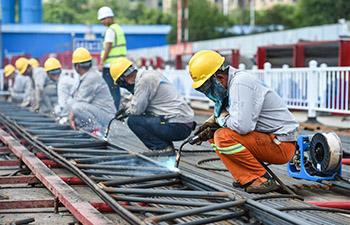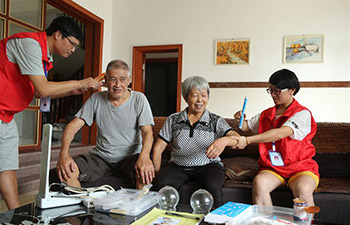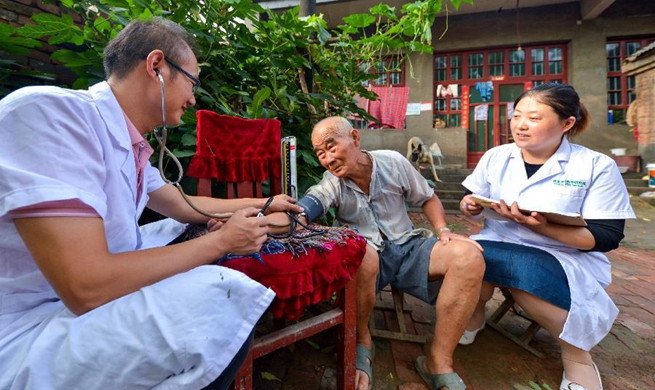by Maria Spiliopoulou, Valentini Anagnostopoulou
ATHENS, Aug. 18 (Xinhua) -- Faced with the hardships of an acute debt crisis which brought Greece at the brink of default, Greeks "invested" among others in their pets to find moments of joy. As the circle of the eight-year bailout era closes on Aug. 20, Chryssa Chatzipavli, will hit the road with Vallie, her three-year old Dachshund who just got her wheelchair.
After a recent serious spinal injury and a gloomy prognosis by vets, Chatzipavli wanted to offer the best solution to her four-legged friend who stood by her side in difficult moments.
She turned down the idea of an expensive and painful operation with uncertain results and called Vassilis Tzigouras, a manufacturer of wheelchairs for pets in Athens.
"After the accident we kept her inside and she was sad... Now she is doing fine... I chose this safe solution which will offer her a happy life," she told Xinhua on Friday.
She did not think twice about the 150-250 euros (171 to 285 U.S. dollars) cost of the custom built wheelchair.
Despite the austerity, even during the years of the crisis, Greeks spent on average 50-80 euros per month on their pets, according to a recent survey carried out by Keeppet, a local portal for pet owners.
Six in ten Greeks who currently have pets adopted them in the past seven years, according to the survey. They are mainly dogs, cats, birds, but also fish and rabbits.
Hundreds of these pets who had a major injury or suffered of illnesses leaving them handicapped, became Tzigouras' clients in the past three years.
PET WHEELCHAIRS BUILDER
A plumber in profession, who grew up with a cat or dog sitting constantly on his lap, Tzigouras is one of the three to four Greeks building wheelchairs for disabled animals.
After watching videos on the internet on dog wheelchairs made of water supply tubes and seeing advertisements by owners of disabled pets on social media seeking "affordable and good quality wheelchairs", Tzigouras decided to try to build one in the summer of 2015.
After consulting vets he made a wheelchair for Lupo, a 16-year-old German Shepherd suffering of degenerative myelopathy. Within the next few weeks he was bombarded with calls to make more and more such carts.
So far, Tzigouras has designed and constructed tailor made wheelchairs for dogs, cats, a goat, a guinea pig, a turtle and a bear, he told Xinhua during an interview at his workshop.
It took him six months to design and built the wheelchair for the bear cub which is hosted in a sanctuary in northern Greece. With the assistance of experts he had to study the way healthy cubs move and how the handicapped bear was struggling.
It takes Tzigouras about a week to meet his four-legged clients at their place so that they feel less anxious, take measurements, design solutions to match their body shape and disability, gather the materials, build and deliver each wheelchair.
He uses mainly lightweight aluminum and his friend Periklia Antonopoulou is working on the handmade anatomical pillow parts. They have clients all over Greece, Cyprus as well as other European countries.
Although he was also hit by the crisis and now he is earning enough to cover his family's needs, he is not in pet wheelchair manufacturing for the money, but for the happiness he spreads, he stressed.
"The moment I see an animal getting up again and being overwhelmed with joy, that moment I tell to myself that I will build another one and another one and another one. I love this thing," he said.
He shares the tears of joy of people who were devastated seeing their friends suffering.
"Some of them are crying when they come here. They are in a bad condition... They shed tears again when we go out for the first walk, but tears of happiness. People are so happy seeing their pets being happy again. The 99 percent of the animals run happy once they have the wheelchairs fitted," he said.
Most of his customers were left disabled by illnesses rather than abuse, he noted.
"There is more work to be done in Greece (in animal protection). There are people who abuse animals in rare cases, there are people who buy animals, get bored and throw them away, but there is also a tremendous effort on the other hand by people who love animals and make, let's say, the impossible possible to give animals a good life," Tzigouras stressed.













